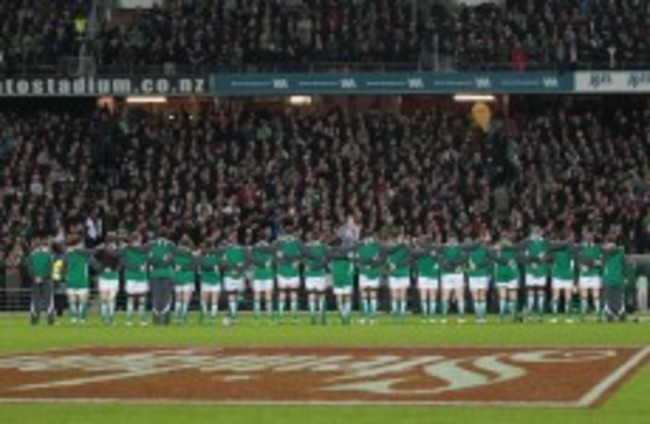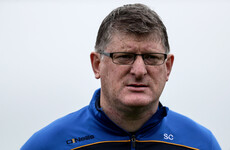WHAT SEEMED LIKE the longest season in Irish rugby history has finally come to an end, albeit in pretty grim circumstances, suffering a humiliating 60-0 loss to New Zealand.
Beginning with a World Cup warm up match against Scotland on 6 August, it was the all-encompassing season which featured a World Cup, a Six Nations and a summer tour.
Now that it has all come to an end, it is a time for reflection and to examine the good, the bad and the ugly of the season that was.
The Good
Although this season could be described as anything but consistent from Ireland, there were a number of excellent one-off performances.
In truth, not many people gave Declan Kidney’s side a chance of beating Australia in the group stage of the World Cup. The Aussies were deemed potential winners of the tournament at the time, with all eyes on the hugely talented half-back pairing of Will Genia and Quade Cooper, who had just steered the Reds to the Super Rugby title and Australia to the Tri-Nations series.
Seemingly out of nowhere, Ireland produced a performance full of aggression and intent, powering past Robbie Deans’s side in convincing fashion and opening up the draw completely in doing so.
Other performances of note were the 17-17 draw in Paris and the gut-wrenching loss to New Zealand in the second test, when Dan Carter cruelly snatched the game for the All Blacks with a last minute drop goal. This standard of performance, although of a very high standard, was too sporadic and wasn’t maintained on a consistent basis.
A number of individuals also enjoyed fine seasons, with people like Rob Kearney, Stephen Ferris, Rory Best, Paul O’Connell, Mike Ross and Cian Healy all immediately springing to mind. The emergence of Donncha Ryan into a top international second row was also a positive along with the unearthing of another option at scrum half and in the back row in the shape of Conor Murray and Peter O’Mahony.
It was also a year that saw Jonny Sexton’s form in an Irish shirt progressively improve, with the Leinster man making that number ten shirt his own. Finally, it was encouraging to see the Irish scrum not only hold its own but also dominate teams on occasion. Even the mighty All Blacks got pushed around in the second test of the summer tour.
However if Twickenham showed us anything, it was how dependant Ireland are on their first choice front row. The loss of Mike Ross in particular usually translates to disaster, but Declan Fitzpatrick’s performances in New Zealand did suggest there may be some light at the end of that particular tunnel.
The Bad
The Six Nations campaign as a whole was a disappointment, with only the two wins to show — against Italy and Scotland. This in itself is underwhelming but it was the manner of the performances, France aside, that drew equal concern.
There seemed to be a lack of a clear and concise game plan in place, with the Irish players reverting to type on occasion in the form of the dreaded static pods either side of the breakdown and aimless kicking, all on the back of slow ball.
Unusually, the Irish defence was also quite passive, particularly against Wales, where they offered their huge backs too much space on the ball. This also occurred in the World Cup clash between the two sides which will ultimately be chalked down as the biggest disappointment of the season as that was a genuine opportunity to reach a World Cup semi-final which was missed.
The selection policy of Declan Kidney must also be questioned as the coach seemingly picked on loyalty rather than form at stages throughout the season. Donncha O’Callaghan, for instance, kept Donncha Ryan out of the Irish team for the Six Nations campaign even though Ryan had displayed better form and had been starting for Munster ahead of his colleague.
In fairness to Kidney, however, his selection policy in the recent tour to New Zealand was more true to form and adventurous. New faces and combinations were given opportunities. Yet, this doesn’t mask the fact that the Irish coach ignored form players throughout the campaign.
The Ugly
The 60-0 battering sustained at Waikato Stadium wasn’t the prettiest was it? A loss for Ireland was always on the cards, given their seismic effort the previous week and the fact that this was the final match in an essentially year-long season. The All Blacks were angry too, having been nearly turned over in Christchurch, and that is generally doesn’t end well for the opposition.
However, that score line will have hurt.
Similarly, the pummelling sustained in Twickenham in the final game of the Six Nations was another low point. Granted, the root of Ireland’s problems in this game stemmed from the scrum but even still, it was an unmerciful beating.
Overall
Declan Kidney has struggled to incorporate the attacking innovation of Leinster into this Ireland team or indeed marry the qualities of the four provinces together successfully on a consistent basis, thus failing to create a clear identity for this team.
There were outstanding performances, yes, but the truth is that they were too few and far between. If Ireland could achieve the standards of the performances against Australia in the World Cup or New Zealand in the second test on a regular basis, they would be a real force.
The question does need to be raised if change is required to achieve this.
Twitter: TomFoxy










The most damning inditement of this team is that they seem to give up when falling behind. Also, Kidney’s failure to appoint an attacking coach is criminal.
After beating the Aussies the so call coach changed the two halfbacks for the welsh game. nNot bringing a secondrow with organisational skills after Paul o Connell was injured was also very stupid. Mike McCarthy’s own mother wouldn’t have brought him ahead of Cullen ( a twice European winning captian)